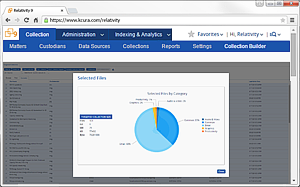During our recent Smarter Collections with Relativity webinar, Jacob Cross, advice specialist from kCura, and I shared how Relativity Collection can help solve some common pain points. As case teams evaluate their collection strategies, they want workflows that are easy for those collecting data as well as the custodians it belongs to, while also keeping deadlines in mind. How can you achieve it all?
Here are four tips for building a collection strategy that will empower your case team to run an efficient, defensible process.
1. Keep technology and processes accessible for everyone.
Don’t reinvent the wheel whenever a need to collect comes along—even (and especially) if you see litigation rarely. Training your team during peacetime can reduce stress and time spent during the real deal.
If only a small number of people are able to run collections for your team, invest in hands-on, specialized training for other staff, or consider alternative methods and tools that are easy for anyone to use.
If the second approach is more realistic in your situation, an intuitive interface for less technical team members will rise to the top of your list of must-haves. Either way, you and your team will be more agile and ready to act if a sudden need does arise.
2. Open opportunities for strategic thinking with a narrowed scope.
As data volumes get bigger and bigger, the collection process gets slower and more expensive. This creates a dilemma when it comes to budgeting for litigation: a large amount of the budget will need to go toward review costs, meaning there is often little left for collection—even though its place upstream could save you in the long run.
To balance these priorities, allow your team to do more than assume you need to capture a custodian's full drive with disk imaging. When appropriate, they can consider running a targeted collection and only collecting the file types potentially relevant to a case. This option reduces the costs and review interference of storing data that won't be used, makes it easier for reviewers to find relevant information, and results in a much faster collection.
3. Offer remote data insight and collection capabilities.
 Between custodian interviews, project scoping, and technical preparation, collection can be a time-consuming step in your e-discovery projects—and coordinating a time to collect custodian data can be challenging and disruptive, especially if your custodians travel frequently. All of this means extra logistical hassle for your team and custodians, and you risk delays, lost files, or spoliation of data in the interim.
Between custodian interviews, project scoping, and technical preparation, collection can be a time-consuming step in your e-discovery projects—and coordinating a time to collect custodian data can be challenging and disruptive, especially if your custodians travel frequently. All of this means extra logistical hassle for your team and custodians, and you risk delays, lost files, or spoliation of data in the interim.
Previewing custodian data before collecting with a tool like Relativity Collection's scout feature helps you determine how much data is present and how long it will take to get it. Even better, remotely launching data preview and collection functions reduces time, travel costs, and interference to the custodian while providing more accurate review forecasting.
Ultimately, you can get data into the hands of reviewers faster, giving you more time to build a strong case—and offering your team more opportunities to focus on the strategy behind your workflows, instead of simple execution.
4. Encourage your team to communicate with custodians whenever possible.
It can be difficult to determine what data needs to be collected, but you’re much better off if you can truly understand early on what information your custodians bring to the table. This is especially tricky in Europe, where the custodian, not the organization, might own the data—and they might not be required to share it.
When it’s appropriate for the case at hand, it’s helpful to work closely with your custodians to gain their insight on the data. Ask for their recommendations on folders and files that might be relevant to litigation to increase your team’s chances of finding and collecting the case’s smoking gun.
A theme from our recent webinar was that it’s important to use a process that can balance the needs of your case team and the custodians while maintaining efficiency and defensibility. Let us know in the comments if these are similar to the guidelines you use when evaluating your collection projects.










